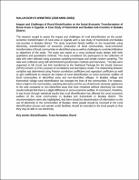| dc.contributor.author | Nalukoobyo, Winifred | |
| dc.date.accessioned | 2018-12-04T09:59:09Z | |
| dc.date.available | 2018-12-04T09:59:09Z | |
| dc.date.issued | 2008 | |
| dc.identifier.citation | Nalukoobyo, W. (2008). Impact and Challenges of Rural Electrification on the Social-Economic Transformation of Rural Areas in Uganda: A Case Study of Kamonkoli and Budaka Sub-Counties in Budaka District. Uganda Martyrs University, Nkozi: Uganda Martyrs University. | en_US |
| dc.identifier.uri | http://hdl.handle.net/20.500.12280/1224 | |
| dc.description.abstract | NALUKOOBYO WINIFRED (2008-M092-20083)
Impact and Challenges of Rural Electrification on the Social-Economic Transformation of Rural Areas in Uganda: A Case Study of Kamonkoli and Budaka Sub-Counties in Budaka District.
The research sought to assess the impact and challenges of rural electrification on the social-economic transformation of rural areas in Uganda with a case study of Kamonkoli and Budaka sub-counties in Budaka district. The study examined family welfare in the households using electricity, transformation of economic production of local communities, socio-economic transformation of local communities in electrified areas as well as challenges to rural electrification as objectives of the study. The study was based on a cross sectional study design with both qualitative and quantitative methods. The study considered 231 participants in the collection of data who were selected using purposive sampling techniques and simple random sampling. The data were collected using self-administered questionnaire methods and interviews. The data were organised in Ms Excel and then transferred to the Statistical Package for the Social Sciences (SPSS) Version 12.0 for purposes of correlations and descriptive results. The relationship between variables was determined using Pearson correlation coefficient and regression coefficient as well as gini coefficients to measure the impact of rural electrification on socio-economic welfare of local communities in electrified areas and non-electrified villages. In Budaka village and Kamonkoli village rural electrification has changed the lives of the communities. For instance, there is light in the communities, watching television and the use of electronic domestic appliances in the area compared to non-electrified areas that have remained without electricity but mean results indicate that there is a slight difference in socio-economic welfare. In conclusion, therefore, it was found through statistical results that rural electrification has affected the socio-economic welfare of the local communities in Budaka and Kamonkoli in Budaka district. The recommendations were also highlighted; that there should be dissemination of information on the use of electricity in the communities of Budaka. More people should be involved in the rural electrification process and special credit facilities should be extended to the local people so that they may be able to use electricity.
Key words: Electrification, Trans-formation, Rural | en_US |
| dc.language.iso | en | en_US |
| dc.publisher | Uganda Martyrs University | en_US |
| dc.subject | Electrification | en_US |
| dc.subject | Trans-formation | en_US |
| dc.subject | Rural | en_US |
| dc.title | Impact and Challenges of Rural Electrification on the Social-Economic Transformation of Rural Areas in Uganda: A Case Study of Kamonkoli and Budaka Sub-Counties in Budaka District. | en_US |
| dc.type | Thesis | en_US |


